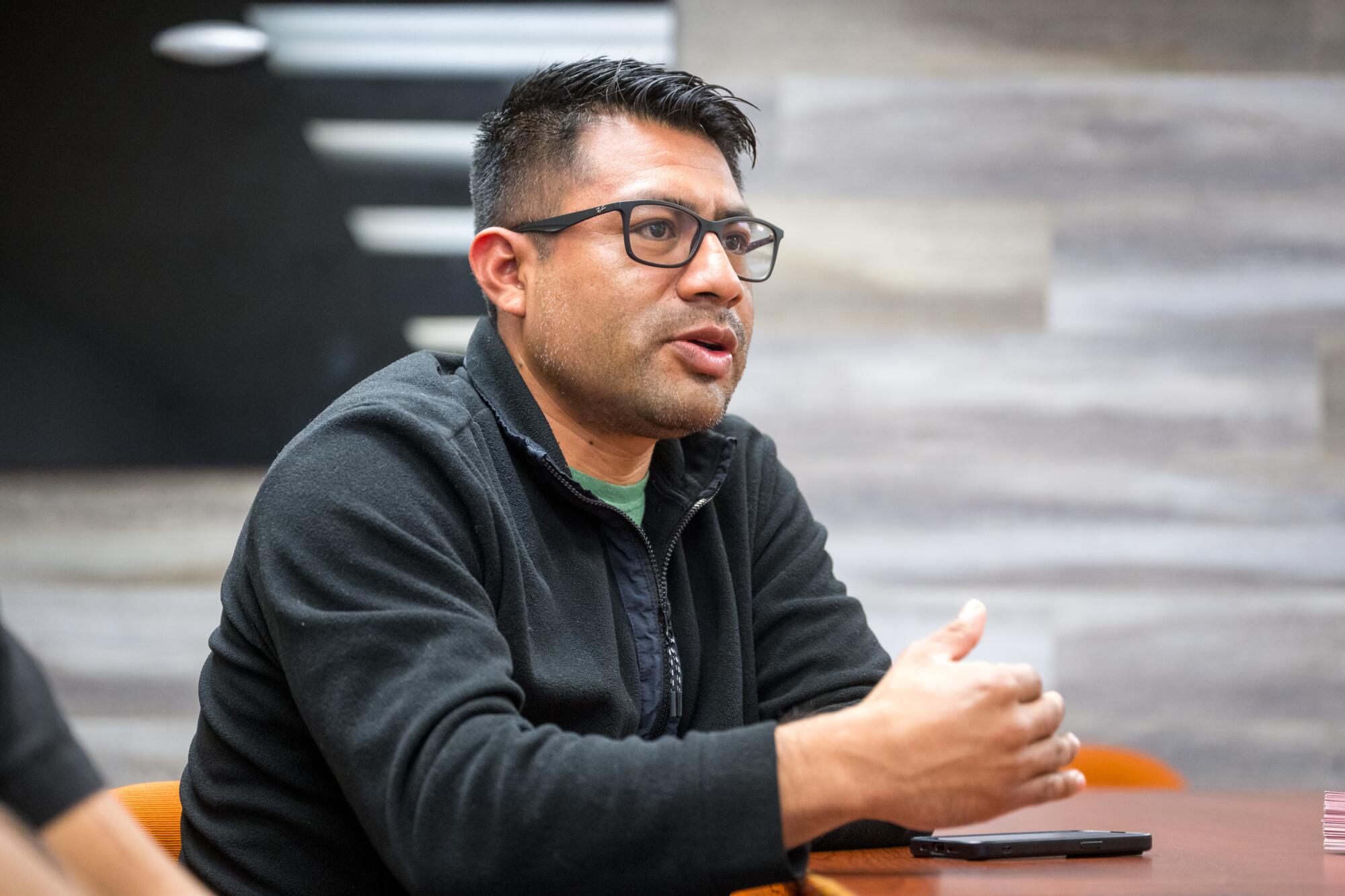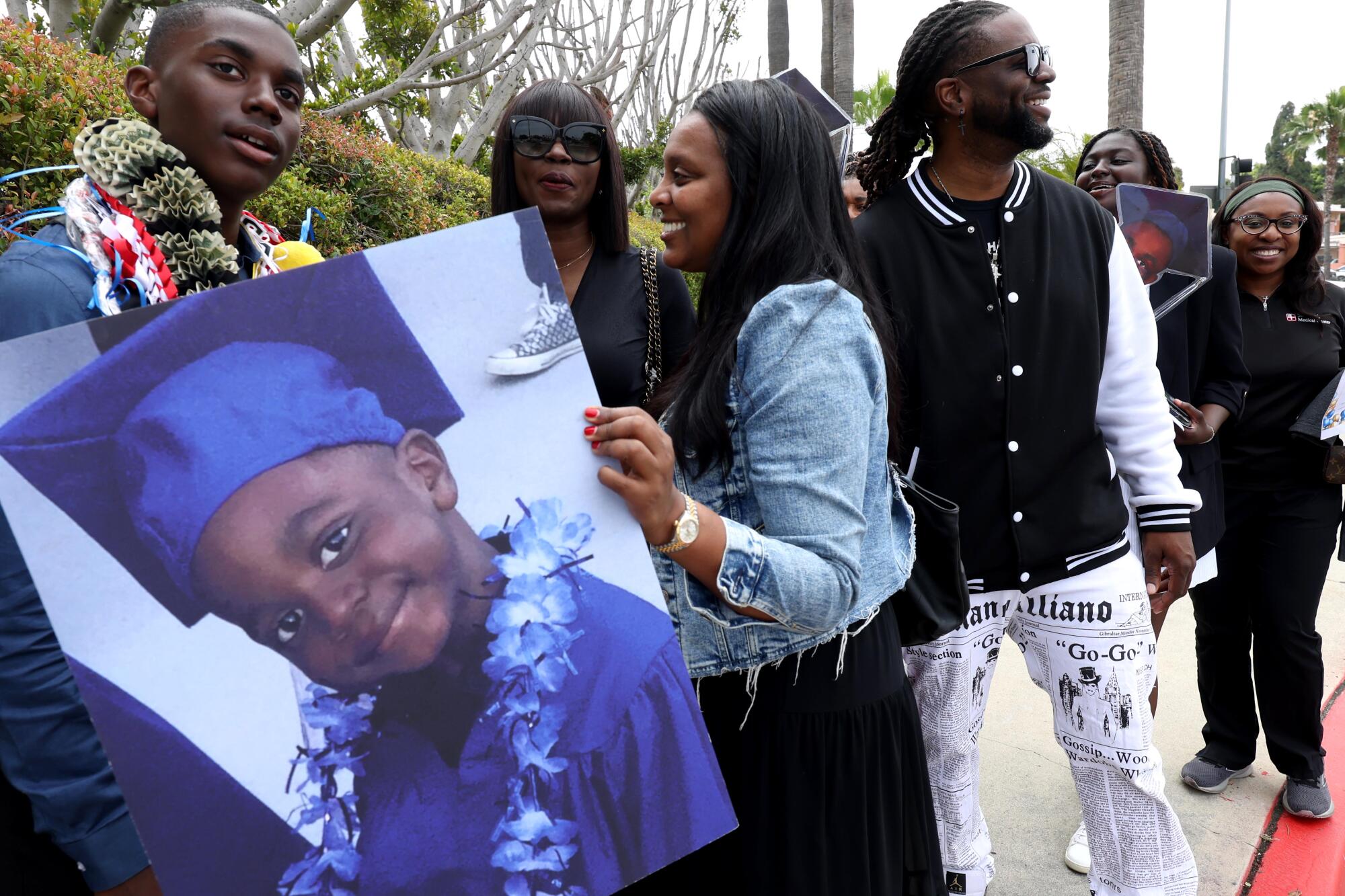Eerie silence hangs over Central Coast farm fields in wake of ICE raids
OXNARD, Calif. — At 6 a.m. Wednesday, Juvenal Solano drove slowly along the cracked roads that border the fields of strawberry and celery that cloak this fertile expanse of Ventura County, his eyes peeled for signs of trouble.
An eerie silence hung over the morning. The workers who would typically be shuffling up and down the strawberry rows were largely absent. The entry gates to many area farms were shut and locked.
Still, Solano, a director with the Mixteco Indigena Community Organizing Project, felt relieved. Silence was better than the chaos that had broken out Tuesday when immigration agents raided fields in Oxnard and fanned out across communities in Ventura and Santa Barbara counties that grow a considerable portion of the state’s strawberries, avocados and celery.
The organization, part of a broader rapid-response network that offers support and counsel for workers targeted by immigration raids, was caught off guard when calls started pouring in from residents reporting federal agents gathering near fields. Group leaders say they have confirmed at least 35 people were detained in the raids, and are still trying to pin down exact numbers.
In the past week, Solano said, the organization had gotten scattered reports of immigration authorities arresting undocumented residents. But Tuesday, he said, marked a new level in approach and scope as federal agents tried to access fields and packinghouses. Solano, like other organizers, are wondering what their next move will be.
“If they didn’t show up in the morning, it’s possible they’ll show up in the afternoon,” Solano said. “We’re going to stay alert to everything that’s happening.”
While agents from Immigration and Customs Enforcement and Border Patrol showed up at food production sites from the Central Coast to the San Joaquin Valley, much of the activity centered on the Oxnard Plain. Maureen McGuire, chief executive of the Ventura County Farm Bureau, said federal agents visited five packing facilities and at least five farms in the region. Agents also stopped people on their way to work, she said.
In many cases, according to McGuire and community leaders, farm owners refused to grant access to the agents, who had no judicial warrants.
California, which grows more than one-third of the nation’s vegetables and more than three-quarters of its fruits and nuts, has long been dependent on undocumented labor to tend its crops. Though a growing number of farm laborers are migrants imported on a seasonal basis through the controversial H-2A visa program, at least half the state’s 255,700 farmworkers are undocumented immigrants, according to UC Merced research. Many have lived in California for years, and have put down roots and started families.
Juvenal Solano, with Mixteco Indigena Community Organizing Project, said Tuesday’s raids in Ventura County farm fields marked a dramatic escalation in tactics.
(Michael Owen Baker / For The Times)
Until this week, California’s agricultural sector had largely escaped the large-scale raids that the Department of Homeland Security has deployed in urban areas, most recently in Los Angeles and Orange counties. California farmers — many of them ardent supporters of Donald Trump — have seemed remarkably calm as the president vowed mass deportations of undocumented workers.
Many expected that Trump would find ways to protect their workforce, noting that without sufficient workers, food would rot in the fields, sending grocery prices skyrocketing.
But this week brought a different message. Asked about enforcement actions in food production regions, Tom Homan, Trump’s chief adviser on border policy, said growers should hire a legal workforce.
“There are programs — you can get people to come in and do that job,” he said. “So work with ICE, work with [U.S. Citizen and Immigration Services], and hire a legal workforce. It’s illegal to knowingly hire an illegal alien.”
Ventura County strawberry fields had far fewer workers Wednesday, a day after federal agents targeted the region for immigration raids.
(Michael Owen Baker / For The Times)
California’s two U.S. senators, both Democrats, issued a joint statement Wednesday decrying the farm raids, saying that targeting farmworkers for deportation would undermine businesses and families.
“Targeting hardworking farmworkers and their families who have been doing the backbreaking work in the fields for decades is unjustified and unconscionable,” Sens. Alex Padilla and Adam Schiff said in their statement.
The California Farm Bureau also issued a statement, warning that continued enforcement would disrupt production.
“We want to be very clear: California agriculture depends on and values its workforce,” said Bryan Little, senior director of policy advocacy at the California Farm Bureau. “We’re still early in the season, with limited harvest activity, but that will soon ramp up. If federal immigration enforcement activities continue in this direction, it will become increasingly difficult to produce food, process it and get it onto grocery store shelves.”
Arcenio Lopez, executive director of MICOP, said he is especially concerned about the prospect of Indigenous workers being detained, because many cannot read or write in English or Spanish, and speak only their Indigenous languages. The organization’s leaders suspect that many of those detained Tuesday are Indigenous, and are rushing to find them before they sign documents for voluntary deportation that they don’t understand. They’re urging that anyone who gets arrested call their hotline, where they offer legal assistance.
Rob Roy, president of the Ventura County Agricultural Association, said he has been warning growers since November that this time would come and providing training on their legal rights. Many know to ask for search warrants, he said. But that still leaves undocumented workers vulnerable on their way to and from work.
“I think overall here, they’re fairly safe on the farms or the building,” Roy said. “But when they leave work, they’re very concerned.”
Elaine Yompian, an organizer with VC Defensa, said she is urging families to stay home, if possible, to avoid exposure.
“We actually told a lot of the families who contacted us, if you can potentially not work today, don’t go,” Yompian said, adding that they are able to provide limited support to families through donations they receive.
Families whose loved ones have been detained are struggling to understand what comes next, she said.
“People are terrified; they don’t know at what point they’re going to be targeted,” Yompian said. “The narrative that they’re taking criminals or taking bad people off the streets is completely false. They’re taking the working-class people that are just trying to get by.”
This article is part of The Times’ equity reporting initiative, funded by the James Irvine Foundation, exploring the challenges facing low-income workers and the efforts being made to address California’s economic divide.


